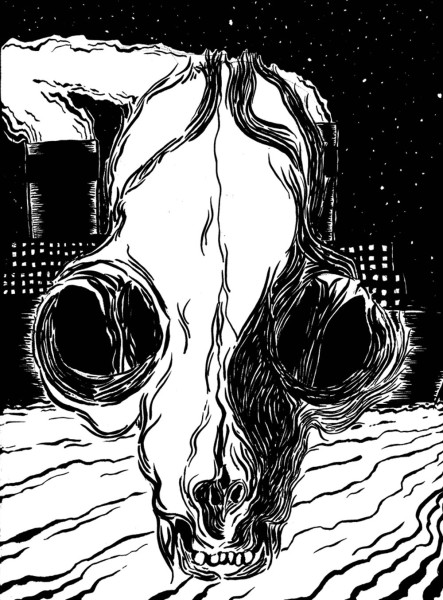In 1887, a young peasant farmer by the name of Ivan Ivanovich ran away from home. What concerns us here today is not his bereft mother, his overbearing father, or his mildly relieved fiancée. Nor is it the rotting stone walls left needing his attention, the hole unmended in the chicken coop roof or the later melancholic longing for his favorite sow about to give birth. Rather, it is the single tiny grass seed hiding in the rolled-up bottom of the left leg of his ill-fitting pants.
The seed found itself, one late summer’s afternoon, sitting by the side of the road, as Ivan made his way home after a watershed walk in the countryside. Buoyed by the imperceptible breeze he created in passing, the seed precariously grabbed onto the possibility of his pants. The carefree spring in Ivan’s step helped it travel down tight into the fold.
That same dark night, Ivan and the seed packed a bag, took a bus, then a train, then talked themselves onto a boat. For days, weeks, months, they travelled together, from port to port, looking for opportunity. And one day, Ivan saw promise in the form of a steamship. Knowing it would take him far, he smuggled himself and his silent partner on board.
Now, if Ivan had found the seed around this point, he would, no doubt, have eaten it and our story would be over. But, during the first thirty days and nights at sea, the seed safely slept within the pants, dry in a dark, sheltered corner of the engine room, while Ivan wasted away to a shimmer of his former self.
Just three days before he would have died, Ivan was discovered by Anton, the ship’s cook, who wandered into the engine room looking for the near-sighted engineer who still owed him money from the last week’s card game. Anton fed Ivan and watered him and rocked him, with the ocean’s help, back to health. And, when Anton told him their destination was Australia, Ivan was happy. He was happy to be going anywhere where there would be dirt under his feet and fresh water and animals to club and kill and cook and eat. And he was happy to be going there with Anton.
When the two men left the boat, they chose not to follow the rush of gold west, but to find lodgings in the new city. And here they stayed, their whole lives, within walking distance of the same creaking wharf where they landed. This is also where Ivan and his secret passenger parted ways.
(We won’t follow Ivan, or Anton, on the rest of their journey. You already know that story: love, hardship, triumph, a bit more hardship, a smidge more triumph and a tad more love, followed by an ultimately tragic, yet uplifting, ending.) We will follow the seed, who has waited patiently all these weeks, months, years, and who—on the very day after the two young men moved into their new lodgings and their landlady, Mrs. Andrews, a less fortunate member of the later famous Essex’s Andrews, finally unrolled the bottom of Ivan’s pants to wash them—was shaken free, falling to land in the fur of Mrs. Andrews’ unfriendly cat, Tom, as he threaded himself in and out of her hirsute sturdy legs. Despite a constant vigilance to self-grooming, Tom’s tongue failed to dislodge the seed and one day he carried it, along with his disgruntled but curious disposition, away from the rat-filled comfort of their backyard, off into the bush, where he met with a snake and lost his final argument.
Tom became a mat of bone and fur, dried then soaked then dried again. Eventually, after more weeks, months, years, he disintegrated to the point where the seed met the surface of the soil. Despite this welcome contact, the seed, hardened by an ancestry of icy Northern winters, found it difficult to take root under the dry yellow sun. But, then, three weeks before the germ inside it would have finally died, the sun cooled and the seed took its chance. Burrowing down into the new red earth with its fragile first roots, pushing its leaves up into the light.
Weathered and watered, one day it was ready to throw its own seeds into the wind and more grass grew. Slowly at first, small tufts here and there, but, over years, decades, it adjusted, evolving a tough outer husk that shielded it from the sun and digestive juices.
People started to notice it and called it new grass. They liked the greeny-gold sheen it gave to their pastures, the way it rustled in the breeze. They liked it more because kangaroos, cows and sheep ate the new grass and became plump. The seeds passed through them, undeterred, and spread far and wide, needing no help from men. More green gold pastures. More fat sheep.
By the time it had travelled to every corner of the continent, people forgot it was new grass and just called it grass.
*
A century after that first seed was sown, the grass grew soft under the grey corduroy pants of a young man lying, one late summer’s afternoon, in Sydney’s busy Hyde Park. And, as Ivan Ivanovich lay there, the great, great, great grandson of the boy who ran away from home, under that same dry yellow sun, now filtered by the heavy green leaves of a Moreton Bay Fig, he felt the head of his fiancée resting on his left leg. She was diligently reading a book of short stories by some old Russian Ivan had never heard of, while he was busy planning a way out.


